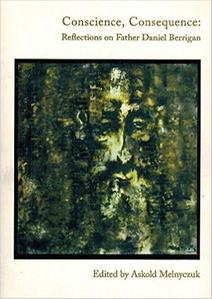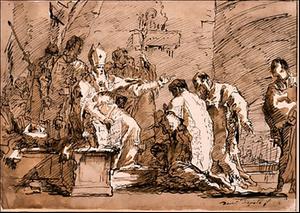Since Father Daniel Berrigan, S.J., died last weekend, there have been hundreds of beautiful reflections and obituaries published, many by people who knew him well. I add my small voice to this chorus only because I'm a reader, and his books have been nearby, wherever I might be, for more than half a century. And I met him once.
Another instance--
time as verb. These are the concluding lines of a poem in Father Berrigan's Beyond Alchemy, a chapbook published in 2006 by Arrowsmith Press, a limited print run, labor-of-literary-love venture. The title was released simultaneously with an anthology, Conscience, Consequence: Reflections on Father Daniel Berrigan, edited by Arrowsmith founder Askold Melnyczuk (author most recently of Smedley's Secret Guide to World Literature).
These are the concluding lines of a poem in Father Berrigan's Beyond Alchemy, a chapbook published in 2006 by Arrowsmith Press, a limited print run, labor-of-literary-love venture. The title was released simultaneously with an anthology, Conscience, Consequence: Reflections on Father Daniel Berrigan, edited by Arrowsmith founder Askold Melnyczuk (author most recently of Smedley's Secret Guide to World Literature).
I had contributed an essay to the anthology, and on December 2 of that year found myself at Friends Meeting House in Cambridge, Mass., for a launch celebration. During Arrowsmith's post-reading reception, I was asked to sit next to Father Berrigan and keep him company while he graciously and patiently signed books for a long line of... the best phrase that comes to mind is comrades in linked arms. So many stories were shared of past meetings, so many expressions of admiration and gratitude.
I've sat in "the chair beside the author" many times as a bookseller. I know the drill. I know how to be helpfully invisible while still keeping an author from feeling abandoned. I did my job, but I also observed Father Berrigan, who at 85 displayed remarkable grace, resilience and focus, engaging his devoted audience one by one while scribbling his name on proffered items (including, oddly enough, a baseball).
Occasionally he would turn to me and smile or make a small joke. He seemed to be--and there are few people, especially authors, in the world I can say this about--the person I'd always imagined he might be.
That singular day--when our paths crossed ever so briefly in a place where words, written as well as spoken, reflected action--also marked the beginning of an amazing moment in my life. Time, verb that it is, sent me to New York City for the rest of the week.
Ancients are writing with pencil stubs
scriptures in a cave.
So begins Father Berrigan's poem "The Prisoners, The Cave." Upon learning of his death last Sunday, I was able, miraculously, to extract some notes I'd scribbled in 2006 from the mysterious depths of my archives. Reading them, I found shadows of that brief stretch of days during which I'd engaged deeply with words and their meanings, sounds and their variations, icons and their spiritual resonance.
At the Metropolitan Museum of Art, I had wandered among apostles and kings at an exhibition called "Set in Stone: The Face in Medieval Sculpture." Some of the relics were survivors of a frenzied post-French Revolution iconoclasm that essentially drove men to "cleanse" Notre-Dame cathedral of its royal and religious icons by beheading statues. Time had done its damage as well, yet the weathered icons retained their eloquence.
While at the Met, I also saw "Brush and Ink: The Chinese Art of Writing," and was struck by the pleasure of writing as art, of the visual and textual blending seamlessly in graceful brush strokes from a thousand years ago.
Marking time. My pilgrimage then took me to the Frick Collection, where an exhibition of 18th century artist Domenico Tiepolo's New Testament drawings made ancient words appear as visions.
My pilgrimage then took me to the Frick Collection, where an exhibition of 18th century artist Domenico Tiepolo's New Testament drawings made ancient words appear as visions.
One night, I moved back in time to the 16th century for a concert at St. Thomas Episcopal Church on 53rd Street and Fifth Avenue. The Tallis Scholars stood at the foot of an awe-inspiring altar and performed choral works by Renaissance masters.
Time as verb. Time travels. We ride along and, if we're very lucky, occasionally stop time for brief moments of grace, like the ones I experienced for a week in 2006 and was reminded of again by Father Berrigan's passing... and his poetry. Here are the opening lines of "Time as Verb":
This is the way
I describe it; what time does
To hands and face.
That old timer
shoots a glance that makes
like God in genesis, you--
a very image and withered
likeness.
I have a treasured bit of memorabilia from 2006. Father Berrigan sent a postcard to Arrowsmith the summer before the anthology was published. On it he wrote something nice about my essay, and his brief message ended with humility: "Someday soon I'll start living up to his praise." But we all know that Father Berrigan earned every word of praise that came his way, and lived up to them for a lifetime. --Robert Gray, contributing editor (column archives available at Fresh Eyes Now)

